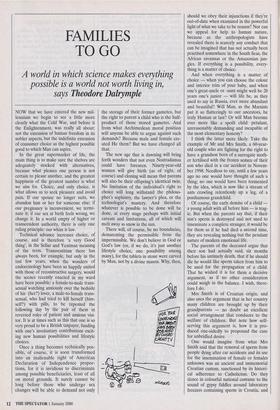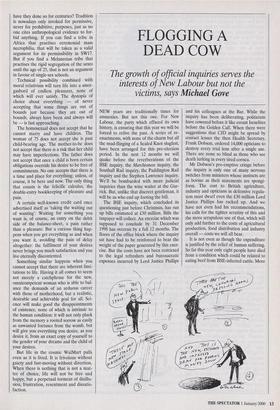FAMILIES TO GO
A world in which science makes everything possible is a world not worth living in,
says Theodore Dalrymple NOW that we have entered the new mil- lennium we begin to see a little more clearly what the Cold War, and before it the Enlightenment, was really all about: not the extension of human freedom in its nobler aspects, but the indefinite extension of consumer choice as the highest possible good to which Man can aspire.
In the great supermarket of life, the main thing is to make sure the shelves are adequately stocked with alternatives, because what pleases one person is not certain to please another, and the greatest happiness of the greatest number is what we aim for. Choice, and only choice, is what allows us to seek pleasure and avoid pain. If our spouse no longer suits, we abandon him or her for someone else; if our pregnancy is inconvenient, we termi- nate it; if our sex at birth feels wrong, we change it. In a world empty of higher or transcendent authority, there is only one ruling principle: our whim is law.
Technical advance increases choice, of course, and is therefore 'a very Good thing', in the Sellar and Yeatman meaning of the term. Transvestitism there has always been, for example, but only in the last few years, when the wonders of endocrinology have been so happily united with those of reconstructive surgery, would the scenes recently enacted in my ward have been possible: a female-to-male trans- sexual watching anxiously over the bedside of his (her?) lover, a male-to-female trans- sexual, who had tried to kill herself (him- self?) with pills, to be repeated the following day by the pair of them in reversed roles of patient and anxious visi- tor. It is at times such as this that one is so very proud to be a British taxpayer, funding with one's involuntary contributions excit- ing new human possibilities and lifestyle choices.
Once a thing becomes technically pos- sible, of course, it is soon transformed into an inalienable right of American Declaration of Independence propor- tions, for it is invidious to discriminate among possible beneficiaries, least of all on moral grounds. It surely cannot be long before those who undergo sex changes will be able to demand not only the storage of their former gametes, but the right to parent a child who is the half- product of those stored gametes. And from what Archimedean moral position will anyone be able to argue against such demands? Because male and female cre- ated He them? But we have changed all that.
The new age that is dawning will bring forth wonders that not even Nostradamus could have foreseen. Ninety-year-old women will give birth (as of right, of course) and cloning will mean that parents will also be their offspring's identical twin. No limitation of the individual's right to choice will long withstand the philoso- pher's sophistry, the lawyer's plea, or the technologist's mastery. And therefore whatever is possible to be done will be done, at every stage perhaps with initial caveats and limitations, all of which will melt away as snow in the sun.
There will, of course, be no boundaries, demarcating the permissible from the impermissible. We don't believe in God or God's law (or, if we do, it's just another lifestyle choice, one possibility among many), for the tablets in stone were carved by Man, not by a divine mason. Why, then, should we obey their injunctions if they're out-of-date when examined in the powerful light of what we take to be reason? Nor can we appeal for help to human nature, because as the anthropologists have revealed there is scarcely any conduct that can be imagined that has not actually been practised somewhere in the South Seas, the African savannas or the Amazonian jun- gles. If everything is a possibility, every- thing is a matter of choice.
And when everything is a matter of choice — when you can choose the colour and interior trim of your baby, and when one's great-uncle or -aunt might well be 20 years one's junior — will life be, as they used to say in Russia, ever more abundant and beautiful? Will Man, as the Marxists put it so flatteringly to our ancestors, be truly Human at last? Or will Man become ever more like a spoilt child: petulant, unreasonably demanding and incapable of the most elementary honesty?
I think the latter more likely. Take the example of Mr and Mrs Smith, a 60-year- old couple who are fighting for the right to have a grandson born of a surrogate moth- er fertilised with the frozen semen of their son who died in a car accident in Novem- ber 1998. Needless to say, until a few years ago no one would have thought of such a thing; no one would have been tormented by the idea, which is now like a stream of ants crawling relentlessly up a leg, of a posthumous grandchild.
Of course, the early demise of a child a young adult with all before him — is trag- ic. But when the parents say that, if their son's sperm is destroyed and not used to inseminate a complete stranger, it would be for them as if he had died a second time, they are revealing nothing but the petulant nature of modern emotional life.
The parents of the deceased argue that their son had actually said, six months before his untimely death, that if he should die he would like sperm taken from him to be used for the propagation of a child. That he wished it is for them a decisive argument, as if no other consideration could weigh in the balance. I wish, there- fore I do.
Mrs Smith is of Croatian origin, and also uses the argument that in her country many children are brought up by their grandparents — no doubt an excellent social arrangement that conduces to the welfare of children. But note how self- serving this argument is, how it is pro- duced one-sidedly to propound the case for unbridled desire.
One would imagine from what Mrs Smith said that the removal of sperm from people dying after car accidents and its use for the insemination of female or females unknown was an ancient and immemorial Croatian custom, sanctioned by its histori- cal adherence to Catholicism. Do they dance in colourful national costume to the sound of gypsy fiddles around laboratory freezers containing sperm in Croatia, and have they done so for centuries? Tradition is nowadays only invoked for permissive, never for prohibitive, purposes, just as no one cites anthropological evidence to for- bid anything. If you can find a tribe in Africa that practises ceremonial mass necrophilia, that will be taken as a valid argument for its permissibility in SW17. But if you find a Melanesian tribe that practises the rigid segregation of the sexes until the age of 25, that is not an argument in favour of single-sex schools.
Technical possibility combined with moral relativism will turn life into a smor- gasbord of endless pleasures, none of which will ever satisfy. The dystopia of choice about everything — of never accepting that some things are out of bounds just because they are out of bounds, always have been and always will be — is fast approaching.
The homosexual does not accept that he cannot marry and have children. The woman of 75 does not accept she is past child-bearing age. The mother-to-be does not accept that there is a risk that her child may have imperfections. The father does not accept that once a child is born certain obligations override his desire to be free of commitments. No one accepts that there is a time and place for everything; unless, of course, it be here and now. The only thing that counts is the felicific calculus, the double-entry bookkeeping of pleasure and pain.
A certain well-known credit card once advertised itself as 'taking the waiting out of wanting'. Waiting for something you want is, of course, an entry on the debit side of the balance-sheet, a pain rather than a pleasure. But a curious thing hap- pens when you get everything as and when you want it, avoiding the pain of delay altogether: the fulfilment of your desires never brings you much satisfaction and you live eternally discontented.
Something similar happens when you cannot accept that there are inherent limi- tations to life. Having it all comes to seem not merely a catchphrase for the new, omnicompetent woman who is able to bal- ance the demands of an arduous career with those of motherhood, but a realistic, desirable and achievable goal for all. Sci- ence will make good the disappointments of existence, none of which is intrinsic to the human condition: it will not only pluck from the memory a rooted sorrow as easily as unwanted foetuses from the womb, but will give you everything you desire, as you desire it, from an exact copy of yourself to the gender of your dreams and the child of your desires.
But life in the cosmic WalMart palls even as it is lived. It is frivolous without gaiety and fast-moving without direction. When there is nothing that is not a mat- ter of choice, life will not be free and happy, but a perpetual torment of disillu- sion, frustration, resentment and dissatis- faction.



















































 Previous page
Previous page